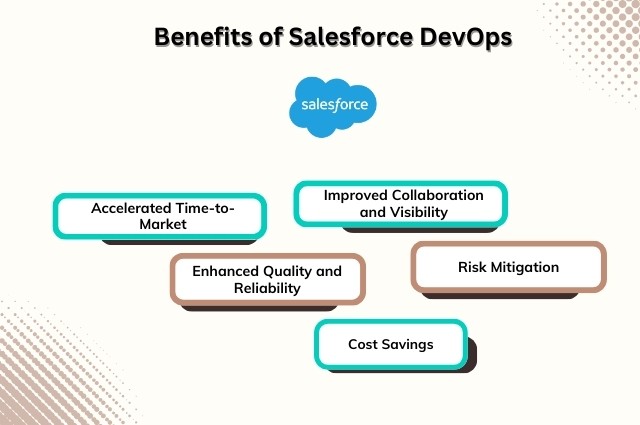
Is Salesforce DevOps the Right Choice for Your Business?
Staying competitive in the business technology landscape requires organizations to adapt swiftly and efficiently. Salesforce, a leading customer relationship management (CRM) platform, has become a foundation for businesses aiming to enhance customer experiences and drive growth. To harness the full potential of Salesforce and streamline development processes, many organizations are turning to Salesforce DevOps.
This blog will explore how Salesforce DevOps can be a game-changer in transforming your business.
What is Salesforce DevOps?
Salesforce DevOps is an approach that combines development and operations to streamline and automate the end-to-end delivery process of Salesforce applications. It encompasses collaboration, continuous integration, continuous delivery, and automation to ensure a seamless workflow. The goal is to enhance agility, reduce time-to-market, and improve the overall quality of Salesforce implementations.
Key Components of Salesforce DevOps
A) Collaboration and Communication
Effective collaboration is the foundation of successful DevOps. Salesforce DevOps encourages close collaboration between development, operations, and business teams. Tools like Salesforce DX (Developer Experience) facilitate version control, allowing teams to work concurrently on different features without conflicts. Integration with collaboration platforms like Slack ensures real-time communication and enhances transparency across teams.
B) Continuous Improvement (CI)
Continuous improvement in software development means breaking down development work into small, manageable segments for faster production. Engineers regularly contribute small pieces of code throughout the day, making testing more straightforward. End-to-end responsibility requires organizations to adapt continually to a changing environment, including new technology, customer needs, or legal changes. DevOps prioritizes continuous improvement to enhance performance, reduce costs, and speed up delivery.
C) Sharing
In DevOps, the saying “sharing is caring” is more than just a good practice. It’s a key idea that helps teams work well together. This means sharing thoughts, the best ways of doing things, and what we know with each other. It makes work transparent and smarter. This way, work doesn’t stop if one person is away. It’s essential to share feedback, best practices, and knowledge among teams to promote transparency, build collective intelligence, and overcome limitations. This approach ensures that the development process doesn’t come to a halt if the only person with specific knowledge is unavailable.
D) Automation
Automation is a core principle of DevOps. Salesforce DevOps leverages automation tools for various tasks, including testing, deployment, and monitoring. Automated testing frameworks like Selenium and ApexMocks help ensure code quality, while deployment automation tools such as Copado and Gearset streamline the deployment process, reducing the likelihood of errors.
Read Blog: Top 10 Salesforce Features to Simplify Your Business Tasks
Benefits of Salesforce DevOps
1) Accelerated Time-to-Market:
One of the primary advantages of Salesforce DevOps is the accelerated time-to-market for new features and enhancements. Organizations can release updates more frequently by automating the development and deployment processes responding quickly to changing business requirements and customer needs.
2) Improved Collaboration and Visibility:
Salesforce DevOps fosters collaboration among cross-functional teams, including developers, administrators, and business analysts. Real-time visibility into the development pipeline ensures everyone is on the same page, reducing miscommunication and enhancing overall project understanding.

3) Enhanced Quality and Reliability:
Automation in testing and deployment processes significantly improves the quality and reliability of Salesforce implementations. Automated testing ensures that new features do not introduce regressions, while automated deployments reduce the likelihood of human errors, leading to more stable and reliable applications.
4) Risk Mitigation:
DevOps practices in Salesforce development mitigate risks associated with manual processes. Automated testing catches issues early in the development cycle, and automated deployments reduce the chance of errors during release. This results in a more predictable and less risky deployment process.
5) Cost Savings:
While implementing Salesforce DevOps may require an initial investment, the long-term cost savings are substantial. Automation reduces the need for manual intervention, saving time and resources. Moreover, the faster time-to-market and improved application quality increase customer satisfaction and, ultimately, revenue.
Challenges and Best Practices
While Salesforce DevOps offers numerous benefits, it’s essential to be aware of potential challenges and adopt best practices to ensure a successful implementation.
- Change Management: Salesforce DevOps introduces changes in development and deployment processes. Proper change management practices, including thorough documentation and training, are crucial to ensure a smooth transition and minimize resistance from teams.
- Security Considerations: Security should be a top priority in any DevOps initiative. Implementing robust security measures in the development and deployment pipeline is critical to safeguard sensitive customer data and prevent unauthorized access.
- Continuous Monitoring and Optimization: Salesforce DevOps is an iterative process. Continuous monitoring and optimization of the development pipeline are essential to identify bottlenecks, improve efficiency, and adapt to evolving business requirements.
Conclusion
Salesforce DevOps is a transformative approach that empowers organizations to harness the full potential of the Salesforce platform. By promoting collaboration, automating processes, and enhancing overall efficiency, Salesforce DevOps accelerates time-to-market, improves application quality, and drives business success.
CRM Masters as a Salesforce Implementation Partner helps businesses navigate the ever-changing landscape of technology. Evaluating Salesforce DevOps is not just an option but a strategic imperative for those aiming to stay competitive and deliver exceptional customer experiences.
Sweet Bonanza 1000 shining crown Shining Crown matbet Sweet Bonanza 1000 Fortune Rabbit pusulabet chicky run chicky run apk












